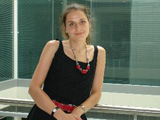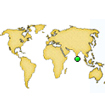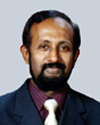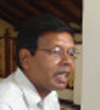COTASS(Colombo Twin and Singleton Survey) Research Programme

A population based twin study on common mental disorders suicidal ideations and alcohol use among twins and singletons in Colombo district.
Team Prof. Matthew Hotopf (BSc, MBBS, MSc, PhD, MRCPsych) Department of Psychological Medicine Institute of Psychiatry King's College- London Dr. Athula Sumathipala
(MBBS, DFM, MD, MRCPsych, CCST, PhD)
Senior Lecturer
Department of Epidemiology
Institute of Psychiatry
King's College- LondonDr. Sisira Siribaddana (MBBS, MD)
Consultant Endocrinologist and Physician
Honorary Lecturer
Kings College - London
Project Leader - SLTR
Visiting Lecturer in Bioethics
University of Kelaniya - Sri LankaDr. D.A.R.K. Dayaratne
(MBBS, MSc (Genetics), MD)
Consultant Resident Physician
General Hospital, Colombo
| Prof. Peter McGuffin | - | Dean & Head of School (Institute of Psychiatry, King's College) |
| Dr. Yulia Kovas | - | Researcher (MRC Social, Genetic & Developmental Psychiatry Centre, Institute of Psychiatry, King's College) |
| Miss Harriet Ball | - | PhD student (MRC Social, Genetic & Developmental Psychiatry Centre, Institute of Psychiatry, King's College) |
| Dr. Nick Glozier | - | Associate Director for Population Health Sciences (George Institute for International Health in Sydney Australia) |
Prof. Peter McGuffin (MB, PhD, FRCP, FRCPsych, FMedSci)
Peter McGuffin was born in Belfast, Ireland and emigrated with his parents at aged 10 to the Isle of Wight, England. He first decided that he wanted to be a psychiatrist at the age of 16 after coming across (something he’d never heard of before) Freud’s ‘Introductory Lectures on Psychoanalysis’, in a local public library. He attended medical school at the University of Leeds, England where he graduated in 1972 and then received postgraduate training in internal medicine. It was at this stage that he became seriously interested in genetics and had his first publications on immunogenetic aspects of coronary heart disease. He transferred this interest to psychiatric disorders and carried out one of the first genetic marker association studies on schizophrenia. He completed his training as a psychiatrist at the Maudsley Hospital, London and was awarded a Medical Research Council (MRC) Fellowship to study genetics at London University and at Washington University, St Louis Missouri. He subsequently became an MRC Senior Clinical Fellow at the Maudsley and the Institute of Psychiatry and then took up the Chair of Psychological Medicine at the University of Wales College of Medicine in Cardiff in 1987. He succeeded Prof Sir Michael Rutter as Director of the MRC Social, Genetic and Developmental Psychiatry Centre at the Institute of Psychiatry in October 1998 and held this post until becoming Dean in January 2007. Despite his very early Freudian leanings Peter McGuffin’s research, his books and papers have been mainly on the genetics of normal and abnormal behavior. He is married ( to Professor Anne Farmer, also an academic psychiatrist) with 3 grown up children and his interests outside of work include horse riding, playing the classical guitar and running with his dogs.
Dean and Head of School
Institute of Psychiatry
Kings College
London

Summary of Proposed Research
Twin studies of psychiatric disorders allow us to determine the degree to which such disorders are heritable within specific populations. Most such studies use volunteer registers of twins, and most are in North America, Europe and Australasia. Thus their generalisability to developing countries is questionable.
The proposed research aims to identify a population based twin study in Sri Lanka. We have performed an extensive investigation of the feasibility of this study funded by the Wellcome Trust. This work indicates that the most feasible method is to use a combination of key informants and door-to-door interviewing in order to identify the twin sample. We have successfully employed workers from the recent census to do this work, and believe the identification of a population-based sample of twins (2000 twin pairs) is feasible. Care will be taken to ensure the sample will be assembled from heterogenous areas in order to ensure a wide cross-section of socio-economic conditions is represented. We aim also to assemble a parallel sample of 1000 singletons in order to determine whether the twin sample is a representative.
Having identified these samples we will interview participants on a range of measures, in order to identify the key phenotypes. These will be ascertained on a diagnostic interview, which will aim to identify current and lifetime common mental disorders (CMDs) such as affective disorders, anxiety, and substance misuse and dependence. We will also measure important environmental risk factors for CMDs, such as life events, deprivation, poor educational attainment and early experiences of abuse and neglect. Most of these measures will be translated into Sinhala using techniques, which have been developed within the research team. Zygosity will be determined from buccal smears using established methods.
The singleton sample will allow us to report current and life-time prevalence rates of psychiatric disorders in Sri Lanka. We will be able to compare these rates with the twin sample to determine the twin study is representative of the wider population. We will then use behavioural genetic techniques in order to determine the Heritability of these disorders and environmental risk factors.
The study will assist in capacity building in Sri Lanka by identifying a population base twin sample which may be used for other phenotypes. The zygosity testing will permit Sri Lankan geneticists to develop their skills in current laboratory methods. The main field work will build capacity in psychiatric Epidemiology, and the translation of the measures will allow further research to be more readily performed in Sri Lanka.
Dr. Yulia Kovas (BA, MA, BSc, MSc, PhD)
Yulia Kovas received a BA and MA in Literature and Linguistics as well as teaching qualifications from the State University of St Petersburg, Russia in 1996. She has taught children of all ages for 6 years, and it is during this time that she first started thinking about the origins of individual variation in cognitive and learning abilities and disabilities, as well as common psychopathology. She has received a a B.Sc. in Psychology from Birkbeck College, University of London in 2003 and an M.Sc. in Social, Genetic, and Developmental Psychiatry from the Institute of Psychiatry, London in 2004. She has received her Ph.D. in 2007 from the SGDP Centre, Institute of Psychiatry (PhD thesis: ‘Generalist genes and mathematics: An interdisciplinary investigation into the aetiology of individual differences in mathematical ability and disability'). Dr Kovas is currently working on two major projects, using Behavioural Genetic methods. Both projects use the twin method in order to identify the relevant genetic and environmental factors. In addition, molecular genetic techniques are being used in order to identify specific DNA markers involved.
-
Investigating the aetilology of individual differences in mathematical and other cognitive abilities, and the aetiology of covariation and comorbidity between different learning abilities and disabilities. This longitudinal, multivariate study is based on the Twins' Early Development Study (TEDS). TEDS is a large population-based study of twins, based at the Social, Genetic, and Environmental Psychiatry Centre, King's College, London.
-
Investigating the aetiology of common mental disorders and addictions and the mechanisms involved in comorbidity between different disorders. This study is a joint project between Sri Lankan Twin Registry and the Institute of Psychiatry, London.
Dr. Yulia Kovas
SGDP Centre
Institute of Psychiatry
King's College
LondonE-mail: y.kovas@iop.kcl.ac.uk

Harriet is a PhD student at the Social, Genetic and Developmental Psychiatry Centre, working with Professor Peter McGuffin. She has worked on the Sri Lanka Twin Registry, the E-Risk study (a sub study of TEDS focusing on environmental influences in childhood) and the Cardiff Depression Study. Her research interests include the quantitative analysis of psychiatric disorders, particularly depression, in order to better understand the interplay of nature and nurture. In 2005 she graduated from the University of Oxford with a BA in Human Sciences, and she was awarded an MSc in Social, Genetic and Developmental Psychiatry in 2006.
SGDP Centre
Institute of Psychiatry
King's College
London

Dr. Nick Glozier (MA, MSc, MBBS, MRCPsych, FRANZCP, PhD)
Nick Glozier is the Associate Director for Population Health Sciences at the George Institute for International Health in Sydney Australia. He has interests in cross-cultural health, behaviours and disability having worked in areas such as mental health services and autism in South Asia, post natal depression in Ethiopia and epilepsy in Australia . Previously he worked at the Institute of Psychiatry in London and with the World Health Organisation, primarily in the area of disability. He remains interested in psychosocial and work related disability research, particularly stigma and discrimination. He has helped developed work stress programmes both with the UK government and large multinational organisations and was an advisor to several insurers in the field. Clinically he was the psychiatrist to health service professionals in London , where he was intimately involved in the response to, and aftermath of, the London transport bombings of 7 th July 2004.
Until arriving in Australia he considered himself a competent sportsman, once representing the UK in triathlon, despite having been shot a few years ago in Trincomalee.
Associate Director
Population Health Sciences
George Institute for International Health
Sydney
Australia

Research Coordinator:
Miss. Chamali Rangika Jayasinghe
Data Entry Operators:
Miss. R. A. Nimesha Thathsarani
Miss. Nilanthi Priyadarshani
Research Assistants:
Mr. Bimal Athula Rathnagoda
Mr. W. M. Aruna Prashantha Walisundara
Mr. R. Pathum Srijayakantha Wijerathne
Miss. Maneesha Chathurangi Jayaweera







